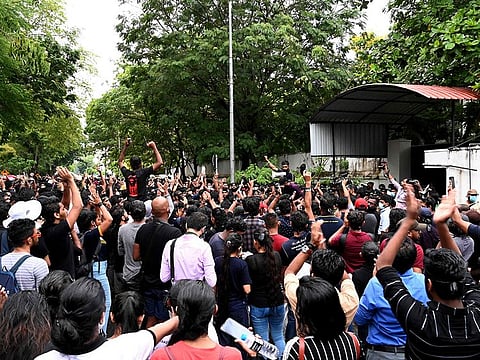Sri Lanka finds itself on the edge of an abyss
The situation has snowballed because the island nation’s thriving economy was mismanaged

A day after the Sri Lanka’s cabinet resigned (April 3, 2022) amid the economic emergency in the country President Gotabaya Rajapaksa called upon all parties represented in the parliament to accept ministerial positions, “to find solutions to this national crisis.”
None picked up the president’s call. For now, only the President and his brother Prime Minister Mahinda Rajapaksa hold their posts.
President’s own supporters have called the move as “old wine in new bottle” and have sought early parliamentary elections. Much of the government benches have deserted, leaving the government in a minority.
Sri Lanka faces thirteen hour a day power cuts, aggravated by an unusually dry season when the reservoirs feeding the hydroelectric projects have fallen historically low while demand has increased due to hot and dry season. Even the street lights are being turned off amid the worst economic crises in decades.
Ability to pay back foreign debt
There is no money to buy fuel. Food prices are rocketing and protests have broken out as Sri Lanka’s government prepares for talks with the International Monetary Fund (IMF) amid concerns over the country’s ability to pay back foreign debt. But any deal with the IMF will take several months to execute.
Immediate credit lines from India expected to be totalling $1.5 billion will only provide short term relief in the shape of fuel, medicines and food stuffs.
The foreign exchange reserves have fallen by 70 per cent since January 2020 to $2.31 billion at the end of February 2022. The country still needs to pay back $4 billion during rest of the year.
The situation has snowballed because it was mismanaged for some time, says the executive director of the Colombo-based Verité Research, Nishan de Mel. What Sri Lankans are facing now is unprecedented, and beyond anything experienced during the decades of civil war, he adds. Credit rating agency Fitch also predicted economic crisis after downgrading Sri Lanka to CC rating in December 2021.
The ill-considered fertiliser bans two years back led to plummeting yields of main crops like rice and tea. Covid-19 pandemic caused 96 per cent decline in tourist earnings, which went down from $3.6 billion in 2019 to only $142 million in 2021. Along with that, declining worker remittances has affected the country’s finances. Consequently, Sri Lanka now faces multiple crises like food and fuel shortages.
A dynamic economy
A dynamic economy in the South Asian context, Sri Lanka’s current predicament is tied to the rise of Rajapaksas — the four brothers and their extended families.
Mahinda Rajapaksa came to power in 2004 initially as the prime minister and then became president after making constitutional amendments empowering the presidency.
Gotabaya, a dual American—Sri Lankan citizen came to power after he won the presidential elections in November 2019, in the wake of Easter bombings, riding on the wave of security issues and immediately amended the constitution concentrating power back in the presidency. Powers had reverted to the prime minister when the Rajapaksas were out of power during 2015 to 2019. He brought back brother Mahinda as the Prime Minister.
Gotabaya was Defence Secretary during his brother Mahinda’s presidency and has faced widespread allegations over the years from Tamil separatists, journalists and opposition figures. Gotabaya denies all these allegations.
Another brother Basil, again a dual Sri Lanka — US national was appointed finance minister in July 2021. The economy has sunk during his term.
The eldest brother, Chamal, was a Cabinet minister, while his son a non-Cabinet minister. One of the prime minister’s sons was also in the Cabinet, another is his chief of staff, and a nephew is a member of parliament.
Even though President Gotabaya Rajapaksa claimed in address to the nation last week that he was “sensitive to the many sufferings the people have had to experience over the past two months,” there are few takers for those assurances at present. Demonstrations against the government have continued unabated in recent days.
Amid this discontent and chaos, the chief government whip, former Highway minister, Johnstone Fernando said that the president with a mandate of 6.9 million people who voted for him “will not resign under any circumstances. We will face this.”
With majority of the parliamentarians crossing the floor the government finds itself in a hard place. Immediate relief and new elections could be the first step on the road to economic recovery.
Sajjad Ashraf served as an adjunct professor at the Lee Kuan Yew School of Public Policy, National University of Singapore from 2009 to 2017. He was a member of Pakistan Foreign Service from 1973 to 2008 and served as an ambassador to several countries.
Sign up for the Daily Briefing
Get the latest news and updates straight to your inbox



